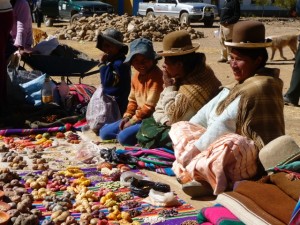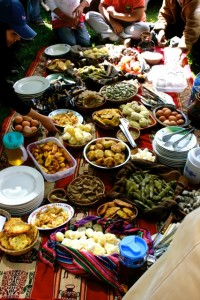By Stephen Taranto, La Paz on Foot

On the shore of Lake Titicaca just 1.5 hours from the Island of the Sun and three hours from La Paz, La Paz on Foot joined forces with SlowFood Bolivia last month, in support of the Intregrated Tourism Associacion of Santiago de Okola (ASITURSO). ASITURSO is an association of farmers from the village of Santiago de Okola, a traditional agricultural community that is recognized as a “Micro-center of Agro-biodiversity.”
La Paz on Foot has been working with the community since 2008 and felt that it was important to invite residents from La Paz to the village, in order to build up a local market for their agro-tourism initiative. The community currently receives around 500 visitors per year and even though La Paz is so close, the vast majority are international travelers. Together with the local chapter of SlowFood, an outing was organized to the village with a traditional meal and community tour as the main activities for the day . . .and of course a warm welcome to return with friends and family for the same.
With more than 65 varieties of potato, 14 varieties of oca (Oxalis tuberosum), 11 varieties of quinoa, 12 varieties of maize and many more crops native to the Central Andes, Santiago de Okola’s agricultural diversity is under threat from the migration of youth to cities, changing weather patterns and the loss of knowledge of how to cultivate and maintain traditional crops.

“Our children and grandchildren don’t want to stay here anymore,” says Tomas Laruta, president and founder of ASITURSO. “As soon as they can they leave Santiago de Okola for the cities of El Alto and La Paz and sometimes even farther. We are hoping that our agro-tourism project can help convince them to stay and perhaps bring some of them back to our village to continue farming.“
SlowFood Bolivia’s recent visit to Santiago de Okola underscored the potential of agro-tourism to help conserve agro-biodiversity. ASITURSO members prepared a traditional apthapi, a shared meal in which each member cooks a typical dish and brings it to one of the members’ homes. All of the ingredients served come from the association’s members farms and are brought from their homes in colorful Andean textiles called t’aris and shared with visitors in a dazzling array of colors, smells and flavours.
La Paz on Foot’s Stephen Taranto explained that La Paz on Foot is doing “everything we can to support ASITURSO’s desire to conserve their agricultural heritage and help stem the migration of youth from the country-side to the cities. If we can show that you can make a living by farming traditional crops, perhaps youth will consider staying connected to their farming villages instead of migrating to La Paz and elsewhere.”
Farmers in the Central Andes have given the world a myriad of delicious, nutritious and highly diverse crops. Community-based initiatives such as ASITURSO are essential to the continued conservation of globally important foods such as potatoes and quinoa, among others. The efforts of ASITURSO are in harmony with the goals of SlowFood Bolivia and SlowFood International and contribute to the sustainability, not only of distant farming villages such as Santiago de Okola, but to food systems around the world.
¡Buen provecho from Bolivia!
